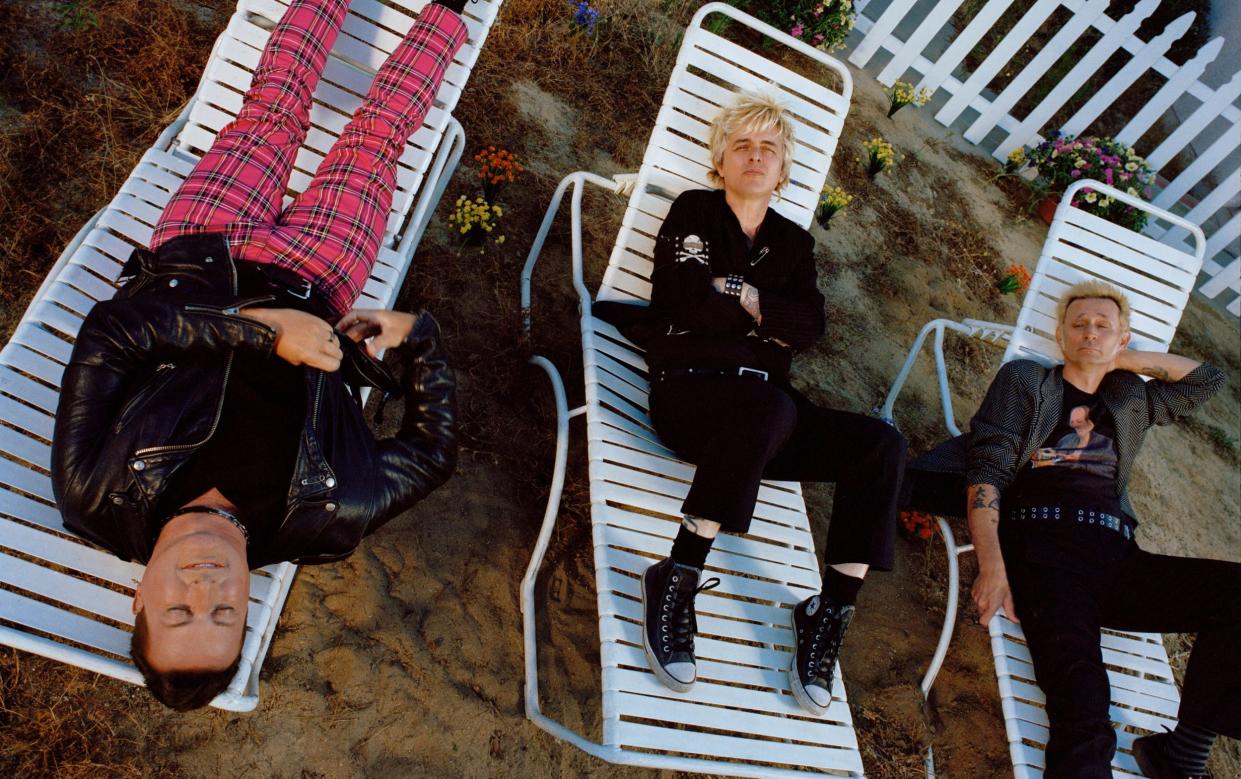Green Day return with outdated pop punk, political posturing and flashes of maturity

Green Day, Saviors ★★★☆☆
“She’s gonna bang her head like 1981,” Billie Joe Armstrong roars on 1981, a full charge punk belter celebrating a year when most original punk groups had broken up or morphed into something more interesting while massive hits from The Human League, Soft Cell and Ultravox signalled the beginning of the synth pop era. Armstrong would have been nine years old.
Green Day fetishise a version of punk that was redundant as a musical movement by the time they discovered it. By reducing the genre to its most simplistic elements: faster, harder and even more cartoonish than the Ramones, the US trio have become multi-million selling global superstars, bigger than any of their original idols (The Ramones, The Clash, The Sex Pistols). Their 1994 major label debut Dookie grabbed the attention of mainstream American teens alienated by hip hop, helping launch a thousand other simplistically snotty pop punk bands with a crisp, commercial style that remains extant amongst pop acts who want to display a bit of angst and bite (as currently exemplified by Olivia Rodrigo).
Yet with its nostalgic fixation on old musical tropes and retro fashion styles (spiky hair, skinny ties, goth makeup), playing pop punk in the 2020s is about as musically, socially and politically revolutionary as being in a rockabilly tribute band. Even the cover photo of Green Day’s 14th studio album Saviors was taken in 1978, depicting a scene from the Northern Irish troubles of dubious relevance to band members or their audience.
Now all family men in their 50s, Green Day are a band who can’t grow up, one of those groups so conceptually honed they become stuck on endless repeat. Saviors is by no means a weak or boring album, it is just the same album Green Day always make.
Armstrong has an easy facility for melody and sharp ear for a pop hook. Songs are built on simple but appealing chord sequences often indebted to early rock’n’roll, which he and his bandmates attack hell for leather with distorted, chugging guitars, thudding bass and charging drums. Melodic verses give way to shouty choruses made up of pithy catchphrases and punny jokes. The subject matter is rude political satire about the state of America (The American Dream is Killing Me, Coma City, Living in the 20s), gleefully crass celebrations of stupidity (Look Ma, No Brains, Fancy Sauce) replete with notes of romantic regret and wistful longing for times gone by (Corvette Summer, Suzie Chapstick, Dilemma).
You can catch glimpses of a more mature album lurking between by-the-numbers pop punk slots, in the epic rock of So Long, Adeline, the orchestral sentimentality of parenthood anthem Father to Son or the lyrical ambition of Strange Days Are Here to Stay, with its conceit of a world that has lost its centre “ever since Bowie died”. But even at its most ambitious, everything is swept up in a blizzard of overcharged guitars and stylised snarling that would have sounded old-fashioned in 1981, let alone 2024. Neil McCormick
Sleater-Kinney, Little Rope ★★★★☆
Something was in the water in Olympia, Washington in the early Nineties – anger, rebellion, a middle finger to gendered expectations – that saw some of riot grrrl’s greatest bands erupt onto the scene. Early pioneers Bikini Kill and Bratmobile eventually gave way to Sleater-Kinney, who released their self-titled debut album in 1995 to critical acclaim and have arguably become the genre’s most enduring success story.
This is born from a refusal to churn out the same record over and over. Their 2019 album, The Center Won’t Hold, was a deeply ambitious, elegant record about fear and desire, produced by Grammy Award-winning US artist St Vincent. It was a period of change for the band – then a trio made up of Carrie Brownstein (also the brains behind hilarious comedy series Portlandia), Corin Tucker and Janet Weiss. Prior to that album’s release, Weiss announced that she would be leaving Sleater-Kinney as the other two were taking a “new direction”.
Although new album Little Rope had largely been recorded when a devastating event in late 2022 changed Brownstein’s life – the death of her mother and step-father in a car accident – the howl of grief is still evident in the delivery of certain songs. Opener Hell positions the fiery afterlife as a “place that we can’t seem to live without”, while Don’t Feel Right lines up a list of mundane activities (“Read more poems, ditch half my meds”) to try to avoid being “warped by grief”. Untidy Creature mourns the loss of another constant in American life – the federal right to legal abortion, stolen by the Supreme Court with their 2022 overturning of Roe v Wade.
Little Rope is undoubtedly Sleater-Kinney’s most commercial album yet. Crusader, in particular, brings to mind the palatable grunginess of No Doubt, and lead single Say It Like You Mean It – with a video starring Succession’s J Smith-Cameron – echoes WH Auden’s Funeral Blues. The film is set at the funeral of a lover, and introduced with a begging request to “stop all the clocks” before the band give in and admit “all clocks have stopped”. They must confront the reality that their lives have forever changed, and accept it. Poppie Platt


